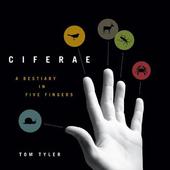
|
CIFERAE: A Bestiary in Five Fingers
Paperback / softback
Main Details
| Title |
CIFERAE: A Bestiary in Five Fingers
|
| Authors and Contributors |
By (author) Tom Tyler
|
| Series | Posthumanities |
|---|
| Physical Properties |
| Format:Paperback / softback | | Pages:376 | | Dimensions(mm): Height 216,Width 216 |
|
| Category/Genre | Non-western philosophy |
|---|
| ISBN/Barcode |
9780816665440
|
| Classifications | Dewey:190 128 |
|---|
| Audience | |
|---|
|
Publishing Details |
| Publisher |
University of Minnesota Press
|
| Imprint |
University of Minnesota Press
|
| Publication Date |
7 March 2012 |
| Publication Country |
United States
|
Description
The Greek philosopher Protagoras, in the opening words of his lost book 'Truth,' famously asserted, 'Man is the measure of all things.' This contention-that humanity cannot know the world except by means of human aptitudes and abilities-has endured through the centuries in the work of diverse writers. In this bold and creative new investigation into the philosophical and intellectual parameters of the question of the animal, Tom Tyler explores a curious fact: in arguing or assuming that knowledge is characteristically human, thinkers have time and again employed animals as examples, metaphors, and fables. From Heidegger's lizard and Popper's bees to Saussure's ox and Freud's wolves, Tyler points out, 'we find a multitude of brutes and beasts crowding into the texts to which they are supposedly unwelcome.'
Author Biography
Tom Tyler is senior lecturer in philosophy and culture at Oxford Brookes University.
Reviews"Tom Tyler's reinvention of the bestiary is a remarkable achievement, and Tyler emerges as an engaging storyteller. The book's teeming pages are full of improbable pleasures, pictorial and philosophical. Presented with modesty and wit, the result is an audacious account of what it is not to be human. This is a beautifully written book of exceptional imaginative range and it amounts to nothing less than a poetics of the posthuman." -Steve Baker, author of The Postmodern Animal "CIFERAE is a remarkable accomplishment. Tyler provides the most subtle and thorough analysis of anthropocentrism I have encountered; and his critical reworking of the relationship between animals and philosophy allows for an extraordinarily rich understanding of more-than-human subjectivities." -Matthew Calarco, California State University, Fullerton "CIFERAE engages and pushes forward the theoretical foundation of human-animal studies. Tyler aptly develops a critique that encourages the recognition of a perspective that decenters human experience as the primary mode through which knowledge is produced. This work also has pragmatic implications, as it clears a path to understanding people's subjective experiences as 'more than human.' " -Society and Animals "Delivers tremendous insight into philosophy's indefensible anthropocentrism, concluding that pragmatic knowledge (and its refusal of a "God's eye view") is most promising." -CHOICE "Sizable but thoroughly convincing. . . [CIFERAE] is a thoroughly enjoyable experiment in literary analysis and creation, a very original attempt at weaving very different themes - epistemology, animals, and hands - into a broad discussion that constantly plays with its own elements." -Journal for Critical Animal Studies "The book is not merely an astute jeu d'esprit around our ways to count and account animals. It also carefully probes the ostensible anthropocentricism of three dominant epistemological paradigms in Western thought: realism, relativism, and pragmatism." -Humanimalia "This book is an experience." -Environmental Values "CIFERAE is a playful philosophy with a serious purpose. This is a cogently argued and beautifully produced (and illustrated) argument for why the persistent invocation of animals in philosophy is significant, and for why animal knowing (as Nietzsche recognized) drives a cart and horses through anthropocentricism." -New Formations "For scholars in science studies and animals studies, CIFERAE offers a thought-provoking and entertaining opening onto a question of central importance: whether and how our membership in the human species, or in any other species, determines what we can know." -Configurations
|